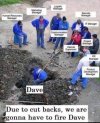Just FYI that I don't see a paywall either, and yet - Sure - As you requested.
Summary: AF cutting many cadets after 2 years, not moving them on to field training and commission.
Most of the article details: ‘We cut too deep’: Air Force reinstates hundreds of ROTC cadets after dismissals spark backlash
The Air Force reversed its decision to dismiss hundreds of reserve officer training cadets and restored nearly 130 scholarships, officials said, after a lobbying effort assailed the decision as a punishment for many qualified cadets that would create catastrophic financial problems.
The pandemic’s wave of economic and social uncertainty triggered the initial decision, officials said. The natural cycle of departing officers creating room for the younger ranks has been disrupted, and service members, wary of leaving jobs and health care, are staying at the highest level in 2 decades.
To rebalance the numbers, the Air Force rejected far more cadets than in past years. The cuts were so drastic that they swallowed up cadets with excellent grades and high fitness marks, according to current and former Air Force officials, sending scores of families into financial panic after scholarships vanished.
Kaili Glasser, a 20-year-old studying mechanical engineering at MIT, said she has flawless grades and rows for the crew team. But her future career and scholarship imploded on a Zoom phone call with her commander on Apr. 20 when she learned of her rejection.
“It was heartbreaking to feel I wasn’t wanted after I put so much in,” she told The Washington Post.
Congressional representatives, retired officers and a wave of parents and students pressed the Air Force behind closed doors to reexamine decisions to reject 1,000 cadets, an Air Force official said. Policy officials relented Thursday evening, reinstating 400 cadets, about 130 of whom won back scholarships.
“We cut too deep,” said Ann Stefanek, an Air Force spokesperson. “We recognized that the planned reductions to meet end strength requirements were going to cause unanticipated hardships for many well-qualified cadets.”
Air Force officials acknowledged that cuts this year were far outside the norm. Historically, the Air Force dismisses about 25 percent of second-year cadets who don’t meet fitness, academic and leadership standards. This year, it cut nearly half of 2,300 cadets in the crucial lead up to junior year, when cadets begin field training.
Reinstating hundreds of cadets puts the rejection rate back into historical norms, Stefanek said. ROTC cadets attend civilian schools rather than service academies. Air Force cadets who stay for the full program commit to at least four years of service.
The reversal relieved stress that families have absorbed in recent weeks. Parents who have been relieved to forgo tuition were beset with panic about costs that in some cases would surpass $100,000.
Timing also compounded worries. The decision in late April fell well beyond transfer and scholarship application deadlines, leaving students marooned if they could not afford the changes.
Officials who oversee the ROTC program realized the gravity of the decision after hearing about the emotional and potential financial turmoil students and parents were put through, an Air Force official said.
The move was celebrated across the country. At Detachment 365 — which serves Harvard, MIT, Wellesley and Tufts — 10 out of nearly two dozen sophomores were cast out, including Glasser, she said. They learned of their dismissal together on a brief and surreal video call.
Glasser went into a tailspin, she said. Her father’s death when she was 14 was a catalyst to take more responsibility and find a way to pay for school. She carved a path to a full scholarship with the Air Force after embracing its culture and values, earning a NASA internship along the way.
She kept news of the rejection secret from her mother until Thursday, when she learned she was reinstated, scholarship and all. She was hit by a wave of relief, but the episode shook Detachment 365 into a more clear-eyed view of military bureaucracy, she said.
“Until now, I had very full trust in the Air Force,” she said. “It wasn’t until this past month that I realized that’s not always how it’s going to be.”
The detachment saw eight total candidates reinstated, bringing a flash of joy tempered with disappointment in Air Force leaders. “Integrity is essential,” wrote one cadet in a group chat discussing the episode, reciting cadet
core values they felt were breached.
“This should have never happened,” said one reinstated cadet, who spoke on the condition of anonymity out of concern for consequences. “The only thing that got them to reverse their decision was attention from outside.”
The detachment, loaded with STEM-focused students at elite colleges, was also shaken over who was initially dismissed from its ranks — five women and five minorities. The military, which has
struggled to elevate minority officers into senior commands, has pledged to do better.
“Cutting off the flow of high-performing women is misguided,” she said. “The lack of intention is the issue.”
There are some ways to reduce the number of officers in uniform who may be stagnant or at retirement, she said, like offering buyouts, or even putting them into undesirable duties to accelerate their exit.
But most solutions are at the entry point, rather than the exit, she said. Air Force officials said to account for the reinstated cadets they may reduce future slots for officer candidate school, which is a separate program.
Cadets now back on track for training have resolved to take leadership lessons from the episode.
“You can grow and develop while the Air Force does the same,” Glasser said. “In 20 years, we shouldn’t be the ones making the same mistake made this year.”


